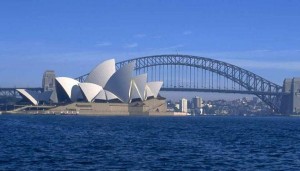Home » Posts tagged 'Australia student visa'
Tag Archives: Australia student visa
Australia:New streamlined student visas to grow Australian education
Minister for Education
Leader of the House
THE HON SCOTT MORRISON MP
Minister for Immigration and Border Protection
MEDIA RELEASE
New streamlined student visas to grow Australian education
The new Coalition Government will move quickly to begin undoing Labor’s damage to Australia’s international education sector—and restore it as one of Australia’s most important economic contributors.
Minister for Immigration and Border Protection, Scott Morrison and Minister for Education, Christopher Pyne announced a package of measures that would simplify student visas through a streamlined assessment-level framework (ALF) and by extending streamlined visa processing arrangements to low-risk non-university degree providers.
“The changes will assist all providers, but particularly the vocational education and training sector, making access to Australia’s education system more attractive for overseas students,” Mr Morrison said.
“Assessment levels under the ALF would be reduced from five levels to three, while financial evidence for AL3 students would reduce from 18 months to 12 months, provided funds were from a close relative of the student applicant. This would mean students from a number of key markets would be able to apply for a student visa with up to $AUD 40 000 less in the bank.”
Streamlining of the visa application process that Mr Morrison announced last week would benefit up to 22 low-risk non-university providers for students enrolled in Bachelor, Masters or Doctoral degree courses or an eligible exchange programme.
Minister for Education Mr Pyne said the measures would attract more overseas students to Australia, benefit our education system, create Australian jobs and stimulate our economy.
“The non-university sector is an important contributor to our overall education exports,” Mr Pyne said.
“These changes would allow the vocational training sector to contribute more freely to our plan to restore Australia’s tertiary education system to its former peak of almost $19 billion in export income for the nation.
“The non-university education system supports thousands of Australian jobs directly, and indirectly.
“If we cut red tape and allow more students into Australia to access a world-class tertiary education we all stand to gain.”
Invitations to the 22 non-university providers will go out in coming weeks.
Subject to relevant legislative change under the stewardship of the Assistant Minister for Immigration and Border Protection, Senator the Hon. Michaelia Cash, the Government would implement both elements of the package in early 2014.
Further information is available at http://www.immi.gov.au/students/whats_new.htm.
Study costs most in Australia
Australia is the most expensive country for overseas students to study in, according to research from HSBC. The combined average cost of university fees and living expenses in Australia puts the average cost at more than USD38,000 per year for international students.
 Today there are more than 3 million people in higher education in a foreign country. But as many countries reduce the levels of state subsidy, students and their families have to plan more carefully than ever to meet the cost of tuition and living expenses.
Today there are more than 3 million people in higher education in a foreign country. But as many countries reduce the levels of state subsidy, students and their families have to plan more carefully than ever to meet the cost of tuition and living expenses.
The USA is the second most expensive country for overseas students, with the combined average cost of university fees and living expenses putting the annual cost at more than USD35,000. The UK is third, with annual costs of more than USD30,000. According to the United Nations Education, Scientific and Cultural Organisation (UNESCO), these two popular destinations attract three in ten international students.
International students studying in Germany pay an average of just USD635 a year for tuition fees
But not all developed markets charge high fees. International students studying in Germany pay an average of just USD635 a year for tuition fees, plus a further USD5,650 in living costs. This makes an annual total of USD6,285, one sixth the cost of studying in Australia. In Japan, while fees are relatively modest, high living costs push up the overall studying bill.
The research, which analysed available data on higher education in 13 countries, found that international student costs in UAE, Singapore and Hong Kong are all above USD20,000 a year.
Malik Sarwar, HSBC’s Global Head of Wealth Development said: “With rising affluence, particularly in developing markets, and an increasingly competitive workplace that demands quality skills and a global outlook, we expect appetite for international education to continue to grow. Even though the market for higher education remains segmented and therefore mispriced at an international level, the cost is going up everywhere as government subsidies are rolled back.
“Those who wish to educate their children overseas have to factor in tuition fees, living costs, exchange rates and inflation. There is a need for parents to ensure their children’s education forms an important part of their financial planning.”
Average annual cost of studying abroad for international students
| Country | Annual fees (USD) | Annual cost of living (USD) | Annual total (USD) |
|---|---|---|---|
| Australia | 25,375 | 13,140 | 38,516 |
| United States | 25,226 | 10,479 | 35,705 |
| United Kingdom | 19,291 | 11,034 | 30,325 |
| United Arab Emirates | 21,371 | 6,004 | 27,375 |
| Canada | 18,474 | 7,537 | 26,011 |
| Canada | 18,474 | 7,537 | 26,011 |
| Singapore | 14,885 | 9,363 | 24,248 |
| Hong Kong | 13,182 | 9,261 | 22,443 |
| Japan | 6,522 | 12,642 | 19,164 |
| Russia | 3,131 | 6,310 | 9,441 |
| China | 3,983 | 4,783 | 8,766 |
| Taiwan | 3,270 | 4,987 | 8,257 |
| Spain | 1,002 | 6,004 | 7,006 |
| Germany | 635 | 5,650 | 6,285 |
The research by HSBC was compiled from publicly available data in 13 countries.
Fees represent the average tuition cost for international students based on the top 10 largest institutions in each relevant country (sourced from individual institution data).
Cost of living sourced from HESA Global Education Rankings 2010 where possible and adjusted to account for inflation and from Expatitsan.co.uk and HSBC Studying Abroad Research (Oct 2012) otherwise.
Source: HSBC
Australia: New post-study work visa for international students
 The Australian Government has announced a plan to introduce new post-study work visas for international students who complete university degrees in Australia.
The Australian Government has announced a plan to introduce new post-study work visas for international students who complete university degrees in Australia.
The new visas will enable international graduates to gain practical work experience in Australia after they graduate and enhance their overall international study experience.
Minister for Tertiary Education, Skills, Jobs and Workplace Relations, Senator Chris Evans, said that international students are “increasingly looking to augment their studies with graduate work experience and this further post-study work visa option will offer university students a more complete study experience in Australia”.
Counsel of International Students Australia President Arfa Noor said “It is very encouraging to see that some of the key areas of concern have been addressed and this is good news for a lot of students and their families, as well as the education industry.”
“The work experience will add value to Australian qualifications and will certainly be an added incentive for students to choose Australia as a destination for further studies and professional development.”
About the new post-study work visa:
- It is proposed that graduates of bachelor and masters by coursework degrees will be able to apply for a two-year work visa at the completion of their degree, while masters by research and PhD graduates will be able to apply for a four-year work visa.
- As a minimum, applicants need to have completed a bachelor degree at an Australian university six months before applying for the visa.
- Students who complete their degree at a non-university institute (such as a private higher education provider or a TAFE institute) will not beeligible.
- The visa has been introduced in response to the Knight Review, which delivered 41 recommendations to the federal government on how to enhance Australia’s student visa program.
- The program is expected to be introduced in 2013.
